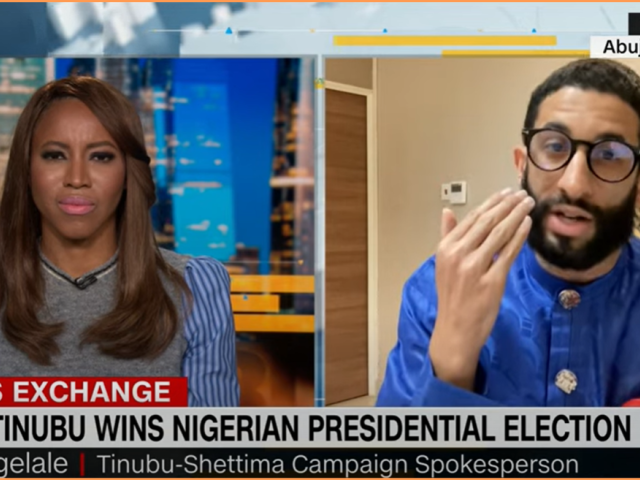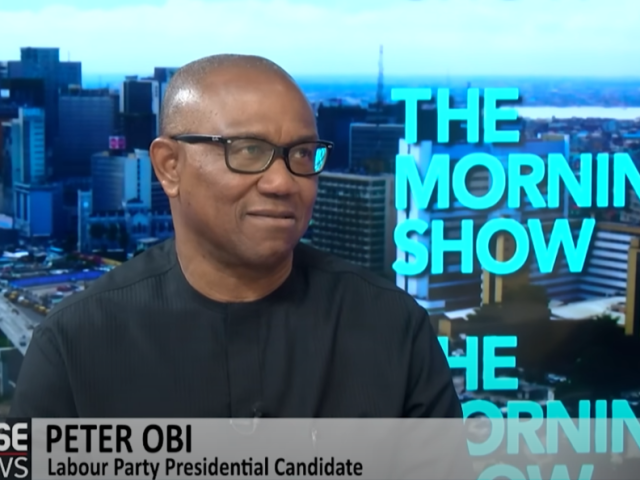IN SHORT: The photoshopped image seems an attempt to turn northern Muslim voters against Labour Party candidate Peter Obi. Not only is he drinking beer – forbidden in Islam – but it’s Hero beer, which has a label that associates it with the southeastern Biafra separatist movement.
An image circulating on social media appears to show Peter Obi, the Labour Party candidate in Nigeria’s upcoming presidential election, eating in a restaurant with two bottles of Hero beer on the table.
Obi is an Igbo from Nigeria’s southeast geopolitical zone and a leading candidate in the election, which is set for 25 February 2023. The image appeared online in late January.
The Hero beer label has a symbol of a yellow rising sun and includes the colours red, green and black – making it similar to the flag of Biafra.
The Republic of Biafra was created in 1967 when Nigeria’s largely Igbo southeastern region seceded from the rest of the country. A brutal 30-month civil war followed, which ended in 1970 with Biafra’s defeat. But a separatist movement continues to work for Biafra’s independence.
A Facebook post with the image has the pidgin caption “Dey Play and flex with hero beer,” which means “Play and enjoy with Hero beer.” The post has been shared 199 times and has more than 10,000 comments.
The image has also been posted on Twitter by Adamu Garba, an influencer and vocal supporter of the Labour Party’s rival All Progressives Congress. Garba’s tweet reads: “Too much pleasure dey worry this wuna presidential aspirant. Double hero beer with Biafra trademark and isiewu full time.”
The word “wuna” is pidgin for “your”, and “isiewu” is Igbo for goat head, a reference to the goat-head pepper soup popular in Nigeria’s southeast zone. (But the three plates in the image actually hold amala, a yam flour meal popular in southwestern Nigeria, and not pepper soup.)
Garba has more than 94,000 Twitter followers and the tweet has been viewed over 737,000 times.

Why is the image significant?
The image seems to show that Obi, a Christian, drinks beer. Alcohol is forbidden under Islam, so it would cast him in a bad light for the many Muslim voters in northern Nigeria. In many parts of the north, the public sale and consumption of alcohol is prohibited by Sharia law.
And the Hero beer in the image associates Obi with the Biafran separatist movement, which is led by Ipob, the Indigenous People of Biafra. The Nigerian government has proscribed Ipob as a terrorist group.
Obi has refuted claims that he is linked to and supported by Ipob. Some northern leaders such as Rabiu Kwankwaso, the New Nigeria People’s Party presidential candidate, have said many northerners will not vote for Obi because of his association with Biafran separatism.
But does the image really show Obi enjoying a meal with two bottles of Hero beer?
Image poorly doctored
There are obvious signs that the image is not original.
Obi’s head and neck seem out of proportion to the rest of his body and don’t fit his posture. They’ve clearly been photoshopped onto the body of someone else.
A Google reverse image search yielded multiple results from Twitter: a photo of a man eating amala on a date.
To create the Obi image, the man’s head has been replaced with Obi’s, the colour of his T-shirt changed from orange to yellow, and the two bottles of an energy drink on the table replaced with bottles of Hero beer.
The photo is fake.
False and misleading information about election candidates have been circulating online for months now, and can only harm Nigerian voters’ ability to make informed choices.
Republish our content for free
For publishers: what to do if your post is rated false
A fact-checker has rated your Facebook or Instagram post as “false”, “altered”, “partly false” or “missing context”. This could have serious consequences. What do you do?
Click on our guide for the steps you should follow.
Publishers guideAfrica Check teams up with Facebook
Africa Check is a partner in Meta's third-party fact-checking programme to help stop the spread of false information on social media.
The content we rate as “false” will be downgraded on Facebook and Instagram. This means fewer people will see it.
You can also help identify false information on Facebook. This guide explains how.




Add new comment